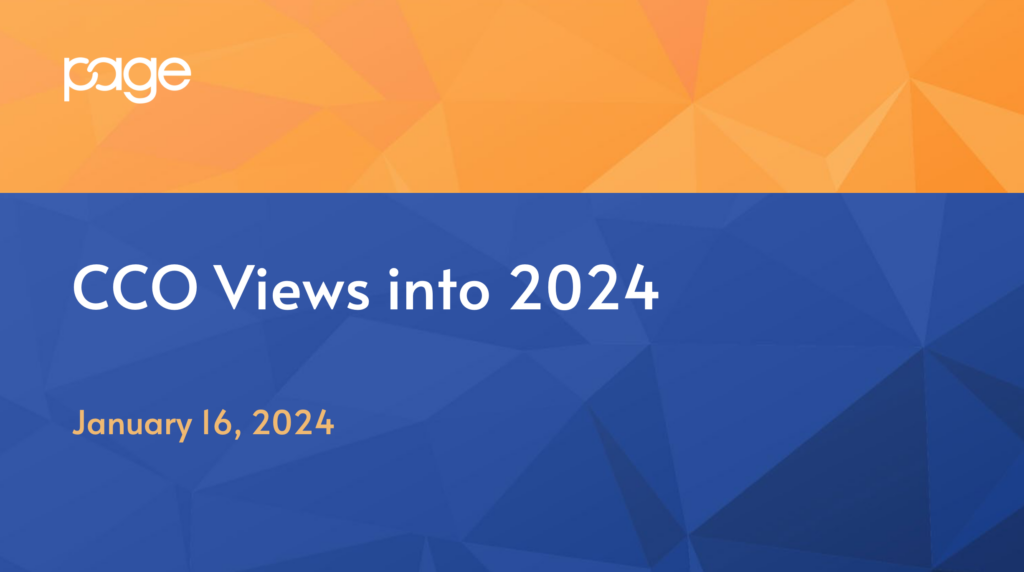This week, Page will host a reception at the World Economic Forum’s Annual Meeting - our second year with an official presence there. To prepare for conversations about how chief communication officers (CCOs) can help their organizations in the year ahead, we asked CCOs in the Page membership for their perspective — the critical risks and opportunities that they see and the advice they think CEOs need to hear right now.
We also partnered with The Harris Poll to conduct a global study on the issues people believe business should be addressing and their confidence in its ability to do so. Representing 10 markets and over 11,000 respondents, it’s Page’s largest public opinion survey ever. In a future post, we’ll highlight a few of the key global themes from that research, noting that there are some substantial differences in individual markets on some of the key issues.
Geopolitics is on the front burner in a year of widespread elections.
The top risk cited by CCOs was geopolitics and elections, mentioned in 45% of responses. This year will see a historic 60 countries head to the polls for elections, representing half of the world’s population and 60% of its economic output. The last two years have seen organizations navigate the implications of unforeseen conflicts in Ukraine and Israel while issues related to corruption, climate and inequality continue to drive political wedges — and that’s without factoring in growing disinformation, which 14% of CCOs cited as a risk threatening the stability of democracy. Diminishing trust in public institutions is raising the expectation that businesses address these sorts of issues. This presents an opening; 13% of CCOs cited their ability to help organizations navigate these sorts of risks as an opportunity.
Polarization is an increasingly destructive force.
Nearly one in three CCOs cited polarization as a top risk as societal fault lines grow deeper and wider. Again, 14% of CCOs cited disinformation and threats to democracy as top risks. Though not cited as a top issue in the public survey, there’s a 21-point gap between the importance of business in addressing polarization in society and its confidence that business can do so. That said, as a function focused on bridging the divides between stakeholders, CCOs frequently mentioned the ability to foster dialogue and seek common ground as an asset.
Employees are worried.
The top two issues on which the public looks to business for leadership are economic stability and growth (90%) and job creation/workforce skill development (88%), with mental health issues (82%) and income inequality (81%) also in the top third. Fortunately, those top two — economic stability and job creation — also have the greatest degree of public confidence in business. At the same time, CCOs are focused on building strong corporate cultures (cited by 13% as a prime opportunity) to attract top talent in a tight labor market. Another 14% of CCOs cited employee issues as a top risk, including employee activism, organized labor and return-to-office mandates frequently mentioned as issues.
Technology is a game changer.
Nearly a third (32%) of CCOs said using new technology for improving the personalization, speed and scale of their communications is a top opportunity, along with getting better at demonstrating tangible ROI. Another 26% cited AI as an opportunity for business, particularly in developing new capabilities and offerings. Interestingly, none of the AI-related issues — addressing its negative impacts, regulating it or using it to improve products — globally ranked in the top half of public issues. As the consciousness of AI and its abilities grow, so, too, will the public’s concerns and expectations for some form of control.
Finally, we asked CCOs what advice they think CEOs need to hear from them right now. Here are a few that stood out to us:
“It’s highly unlikely that your personal social/political views match those of a diverse workforce. Tread lightly making statements on behalf of an entire company.”
“Truth and authenticity are still paramount. Employees want to know that their employer cares and is not caring selectively.”
“Embrace the world of hybrid work. There’s no going back and it offers clear advantages. Be intentional about your hybrid work strategy and stick to it.”
“ESG backlash is real, but so is the need to make progress against the agenda in measured ways. It’s a balance.”
“It’s been a pressure-filled four years. Stress takes a toll. Make sure leaders are not burnt out.”
Special thanks to Rob Jekielek and The Harris Poll for their partnership on the public opinion study. Watch this space for more updates from Page’s participation at Davos.
